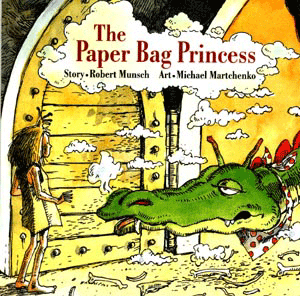Had a wife and couldn't keep her.
He put her in a pumpkin shell
And there he kept her, very well.”
Do you really want your children reading something like this?
A lot of literature for kids doesn't cast women in the best light. Stories can be overtly sexist, write female characters as two-dimensional, or imply that certain outdated cultural values should be held in the highest regard. Lots of adults get attached to books they knew as children and, when sentimentality prevails over logic, read these women-negative tales to their own kids. Or maybe because fewer books are written for kids than for adults do we delve again and again into nonsense like the nursery rhyme above. It seems that until very recently, strong female representations were few and far between.
Got a kid? Baby sitting? Here are a few suggestions for stories with good feminist ideals. Please read to girls and boys alike.
 The Paper Bag Princess by Robert Munsch: This book does play into the girls-reading-about-princesses stereotype, but that's where it ends. Elizabeth is a clever and brave heroine who stands up to a dragon to save her Prince Charming. When he turns out to be obsessed with her looks above all else, she dumps him.
The Paper Bag Princess by Robert Munsch: This book does play into the girls-reading-about-princesses stereotype, but that's where it ends. Elizabeth is a clever and brave heroine who stands up to a dragon to save her Prince Charming. When he turns out to be obsessed with her looks above all else, she dumps him.
Princess Smartypants by Babette Cole: "Princess Smartypants did not want to get married. She enjoyed being a Ms." No matter how many suitors, she is always able to find a new, impossible challenge for her hand. No one can meet her demands, and the princess stays happily single. Another smart, independent, self-actualized princess for young readers.
 Tough Chicks by Cece Meng: Penny, Polly and Molly aren't your typical chicks; they run wild, wrestle the livestock, and tinker with the tractor. The rest of the barnyard is appalled by their behavior, but mama hen believes they are different in a good way. And of course, their independence saves the day in the end.
Tough Chicks by Cece Meng: Penny, Polly and Molly aren't your typical chicks; they run wild, wrestle the livestock, and tinker with the tractor. The rest of the barnyard is appalled by their behavior, but mama hen believes they are different in a good way. And of course, their independence saves the day in the end. The Country Bunny and the Little Gold Shoes by DuBose Heyward: Written in 1939 (!), Country Bunny tells the story of Cottontail. She's always dreamed of becoming the Easter Bunny but shelved her aspirations in order take care of her 21 children. She eventually realizes her goal, winning the job with wisdom, kindness, determination... and speed, a skill perfected by chasing her multitude of children. A refreshing take on mothers and their many talents.
The Country Bunny and the Little Gold Shoes by DuBose Heyward: Written in 1939 (!), Country Bunny tells the story of Cottontail. She's always dreamed of becoming the Easter Bunny but shelved her aspirations in order take care of her 21 children. She eventually realizes her goal, winning the job with wisdom, kindness, determination... and speed, a skill perfected by chasing her multitude of children. A refreshing take on mothers and their many talents.Not all books have an explicitly feminist message, but strong females characters can model one of the most important feminist principles of all- be yourself. Some examples: Harriet The Spy by Louise Fitzhugh, Sabriel by Garth Nix, Pippi Longstocking by Astrid Lindgren, the Ramona Quimby books by Beverly Cleary, Matilda by Roald Dahl, The True Confessions of Charlotte Doyle by Avi.
Is your favorite feminist book for young readers missing? Please suggest more in the comments section.
No comments:
Post a Comment